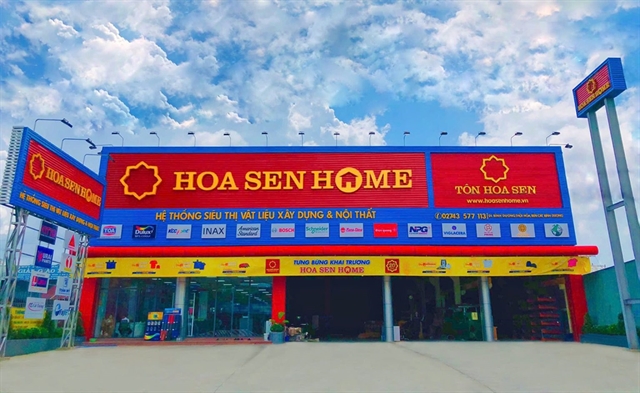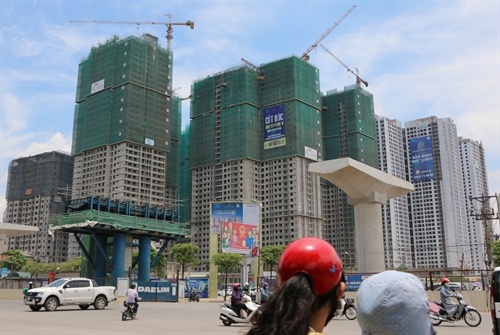 Economy
Economy

Taking out mortgages for property projects is a normal practice among developers, and laws would protect the interests of buyers who have bought mortgaged property products, according to experts.
 |
| Apartment buildings under construction in Ha Noi. Mortgaged housing projects are essential but must avoid misunderstandings. - VNS Photo Đoàn Tùng |
HÀ NỘI – Taking out mortgages for property projects is a normal practice among developers, and laws would protect the interests of buyers who have bought mortgaged property products, according to experts.
Recently, the HCM City Department of Natural Resources and Environment published a list of 77 apartment projects that have been registered at land registration offices as mortgaged assets. The list has been submitted to relevant offices in the city and also uploaded on the Land Registration Office’s website.
The action is said to have been prompted by the Harmona scandal in the city a few months ago. More than 600 buyers of Harmona apartments in the city’s Tân Bình District got a rude shock one day when they were told their homes would be seized by a bank because the developer had mortgaged the building and failed to repay the loan. That meant nearly 2,000 people living there had to leave their apartments despite already making full payments.
As a result, the city has decided to make the legal status of property projects public to reduce the risk for buyers.
Later, Hà Nội’s Department of Natural Resources and Environment also published a list of 26 apartment projects that had taken out mortgages at banks to get capital for developing the projects.
Now, the capital city has a total of 300 property projects, while HCM City has 584 property projects.
The announcement was necessary to protect the interest of buyers, investors and banks, and to ensure transparency on the property market, Phạm Ngọc Liên, director of the HCM City Land Registration Office, said at a seminar held by the Pháp luật Thành phố HCM newspaper on August 2.
Vũ Thị Khuyên, a representative of the HCM City Construction Department, said it was normal for enterprises to mobilise capital from society, including buyers and banks, to develop property projects. Investors of the projects must be certified by the city’s construction department to be eligible investors of mobilising capital.
Bank and financial expert Đặng Quốc Tiến said all enterprises could take loans out for their businesses. Banks pay attention to the ability of investors to repay loans, as well as the legal status and feasibility of the projects, before deciding to give them loans, he said.
Lê Hoàng Châu, chairman of the HCM City Real Estate Association, said it was the responsibility of parties involved in the projects to release public information about the mortgaged property projects. However, Châu said, the parties should carefully consider their announcements regarding mortgage information to avoid misunderstandings from buyers, who sometimes have the misconception that mortgaged projects are weak projects, even though it is a common practice.
Lê Hùng Mạnh, general director of Gia Hòa Company, which has mortgaged projects in HCM City, supports publicising information on mortgaged property projects.
But the HCM City Resources and Environment Department had not prepared well for this plan, he said. The department should co-operate with property enterprises and media to hold press conferences on announcing the mortgaged projects in order to provide thorough information on this issue, he suggested.
Protecting buyers
Nguyễn Hữu Nghĩa, deputy director of Hà Nội Resources and Environment, said mortgages taken out for commercial projects are both normal in business and in compliance with the law.
State offices have controlled mortgaged projects, and mortgages would not affect the interests of apartment buyers, he said.
In fact, apartment buyers of some mortgaged projects had received ownership of real estate certificates. In addition, investors of those projects had implemented all their rights and obligations in lending capital and selling property products, he said.
In the future, the HCM City Resource and Environment Department and the HCM City Land Registration Office would update information regarding the repayment of loans for mortgaged projects, said Phạm Ngọc Liên, director of HCM City Land Registration Office.
The departments expect to organise a meeting between investors, banks and apartment buyers to find the best solutions and ensure more transparency on the local property market, he said.
To protect property buyers, Lê Hoàng Châu, chairman of the HCM City Real Estate Association, said the resources and environment departments should provide more information about investors’ purpose of mortgaging their projects at banks, including plans for developing and constructing the project. Buyers would need to know this information before deciding to buy the property product, Châu said.
He added that banks should also supervise investors that have mortgaged projects to ensure that investors use loans and capital mobilised from buyers for the right purpose - completing the projects and handing the apartments over to buyers.
Phạm Sỹ Liêm, deputy chairman of the Việt Nam Construction Association, said some investors mortgaged their property projects to get banking loans to develop the projects, but in fact, they used the loans for other purposes, prohibiting them from handing over apartments to buyers.
Therefore, he said property buyers should take down information at State management offices about the property products they want to buy before deciding to buy apartments that are part of mortgaged property projects.
The buyers could contact the Hà Nội resource and environment department to receive a consultation on property projects to determine if the projects have a certificate of real estate ownership, Nghĩa said. - VNS




